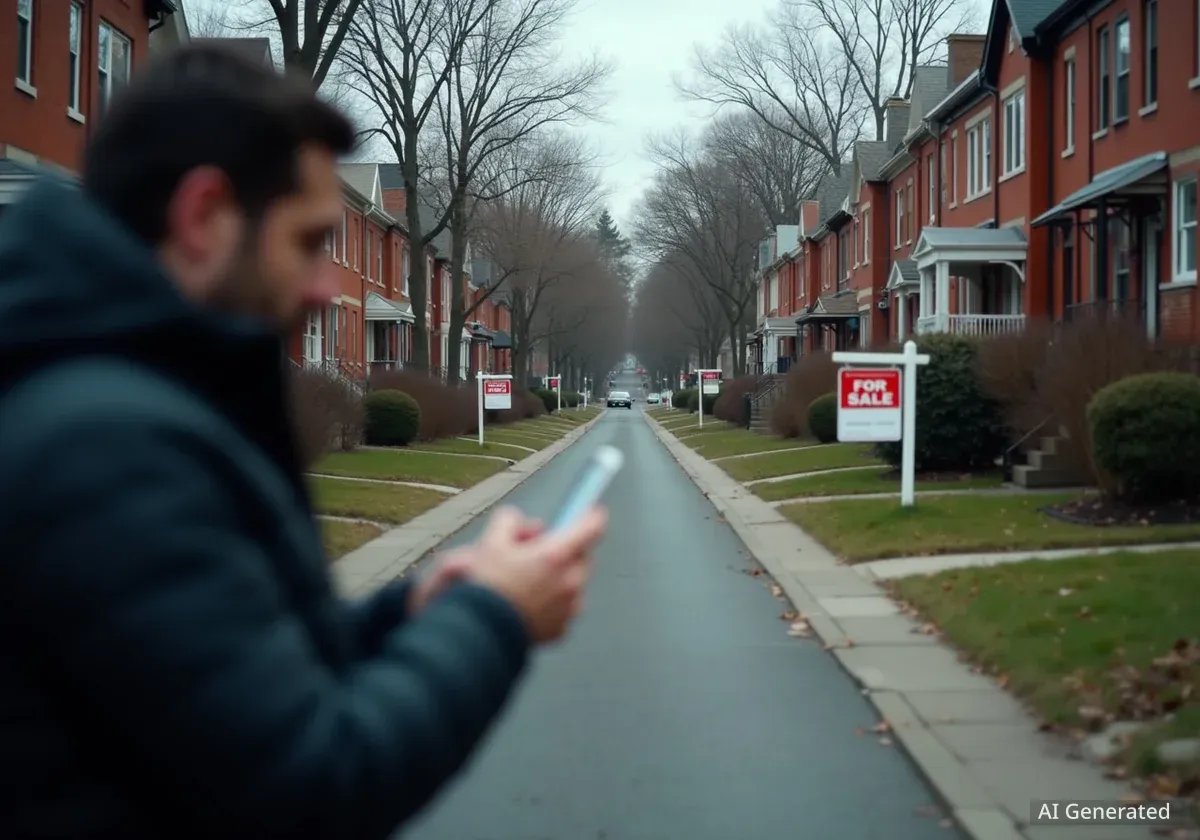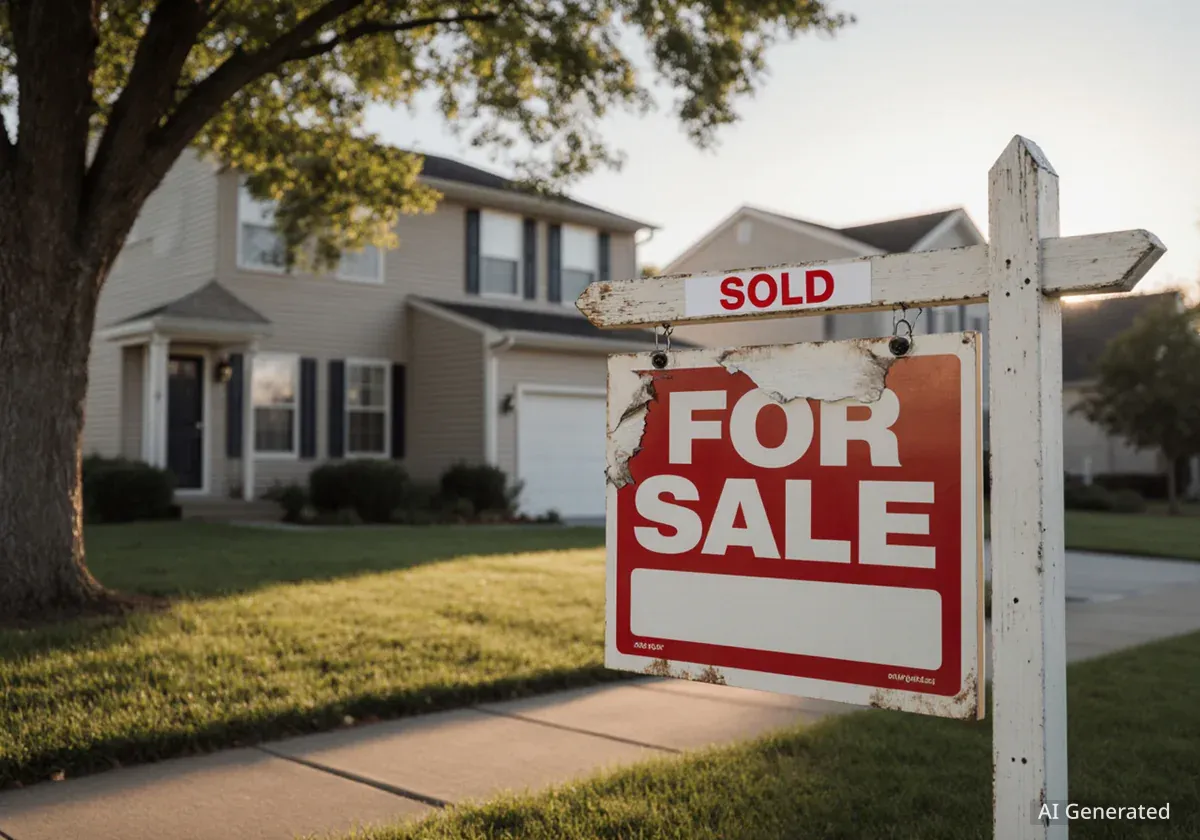A significant shift is underway in Philadelphia's housing market, where corporate investors acquired approximately one-quarter of all single-family homes sold over a recent six-year period. New research reveals this trend is most concentrated in predominantly Black and Hispanic neighborhoods, raising concerns among residents and policymakers about the future of affordable homeownership in the city.
The study, which analyzed sales data from 2017 to 2022, highlights how these purchases are reshaping communities, impacting housing stability, and altering the traditional path to homeownership for many Philadelphians.
Key Takeaways
- Corporate investors purchased about 25% of all single-family homes in Philadelphia between 2017 and 2022.
- Investment is heavily focused on predominantly Black and Hispanic neighborhoods with lower property values.
- These companies primarily operate as landlords, rather than flipping properties for resale.
- Data shows investor-owned properties have a higher rate of code violations and eviction filings compared to individual homeowners.
- Residents express growing fears about decreased affordability, rising property taxes, and the displacement of longtime community members.
A Shifting Ownership Landscape
Philadelphia, a city long defined by its neighborhoods of row homes and a strong culture of homeownership, is facing a new economic reality. A detailed report from the Reinvestment Fund, conducted in partnership with Rutgers Law School, provides the first comprehensive look at the scale and nature of corporate investment in the city's residential real estate.
Between 2017 and 2022, companies ranging from small firms to large institutional investors were responsible for a quarter of single-family home sales. This activity was not evenly distributed. Instead, investors targeted specific areas, including Germantown, Cobbs Creek, Brewerytown, and Parkside, where housing is more affordable.
Emily Dowdall, president of policy solutions at the Reinvestment Fund, noted the potential consequences of this trend. She explained that the influx of corporate buyers can crowd out first-time and lower-income homebuyers, making it harder for them to compete in the market.
"Because affordable home ownership has been such an important part of Philadelphia’s identity, it does, in a sense, lead to a bit of an identity crisis of what kind of city are we if we’re not offering that upward mobility or just even generational stability for folks to own a piece of their neighborhood," Dowdall said.
Philadelphia's Housing Snapshot
The city's homeownership rate currently stands at approximately 52%. The majority of its housing stock was constructed before 1960, with many properties requiring significant repairs.
The Impact on Neighborhoods and Residents
For longtime residents, the changes are not just statistical—they are visible on their blocks and felt in their communities. Rodney Willis, a resident of Cobbs Creek for decades, has watched with growing concern as properties around him are sold to corporate entities.
"When homeowners are not the majority, a lot of things start to go sideways," Willis stated, expressing a fear that the social fabric of his community is at risk. He noted seeing eight homes on his block go up for sale in just the last 18 months, an unprecedented rate of turnover. "We are struggling to hold the line."
This sentiment is shared by others. Vandelyn Waring, another Cobbs Creek resident, worries that the investment will drive up property values and taxes, potentially forcing out people who have lived in the neighborhood for generations.
"The interest in Cobbs Creek is a great thing, but it is a problem for residents who have been here for a very long time," Waring explained. "It’s extremely heartbreaking to see what is happening."
Landlord Practices and Housing Stability
The research also delved into the behavior of these corporate landlords. It found that both large and small investors were more likely to have code violations on their properties than individual homeowners. Furthermore, large corporate investors were found to file for eviction at a higher rate than smaller investors.
"There are some investor models that heavily rely on evictions and filing evictions just to collect rent," Dowdall pointed out. An eviction filing, even if it doesn't result in a lockout, creates a permanent record that can make it difficult for tenants to find stable housing in the future. In Philadelphia, data shows Black mothers are disproportionately affected by evictions.
The Role of Limited Liability Companies (LLCs)
Most corporate investors purchase properties through Limited Liability Companies, or LLCs. This business structure protects the owners from personal responsibility for debts or liabilities. However, it can also make it difficult for tenants and city officials to identify the actual owner of a property, creating accountability challenges when problems arise.
The Investor Perspective and Market Dynamics
While the trend raises concerns, it also fills a specific need in the city's housing ecosystem. With a large number of older homes needing substantial investment, corporate buyers often step in to perform necessary repairs and upgrades that individual owners may not be able to afford. The study found that investors sought permits for repair work at a higher rate than individual buyers, suggesting they are renovating properties to prepare them for the rental market.
Philip Balderston, CEO of Odin Properties, a company that was active in the market, argued that corporate investors provide essential rental housing. He noted that these rental options are crucial for residents who cannot afford to buy a home.
Balderston's company purchased nearly 160 single-family homes between 2017 and 2019, later selling them to other corporate buyers who maintained them as rentals. He suggested that individual buyers are not being shut out of the market entirely. "Individuals who are looking for homes in those neighborhoods when they’re for sale, those individuals are purchasing those homes," he said.
A Call for Policy Intervention
In response to the findings, researchers and community advocates are calling for new policies to create a more balanced housing market. The report outlines several recommendations for local lawmakers aimed at increasing transparency and accountability.
Key proposals include:
- Ownership Disclosure: Creating legislation that requires companies to disclose the individuals behind the LLCs that own rental properties.
- Enhanced Enforcement: Stepping up enforcement of existing laws, particularly those related to rental licenses, to ensure all landlords provide safe and habitable housing.
- Priority at Sheriff Sales: Giving nonprofits and individuals priority bidding status at sheriff sales for tax-delinquent properties. This status, currently held only by the Philadelphia Land Bank, would allow them to make noncompetitive bids, preventing investors from acquiring these homes.
The goal, according to Dowdall, is not to stop investment but to manage its effects. "It’s up to officials to try and mitigate any negative consequences of those investments as well as promote some of the positive aspects of development and investment in order to stabilize neighborhoods," she concluded.
As Philadelphia navigates this period of intense interest from corporate investors, the challenge for city leaders will be to balance economic development with the preservation of the communities that define the city's character.





